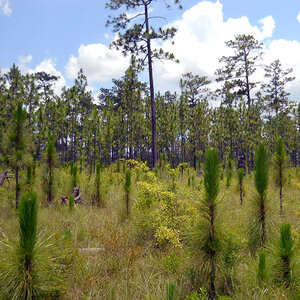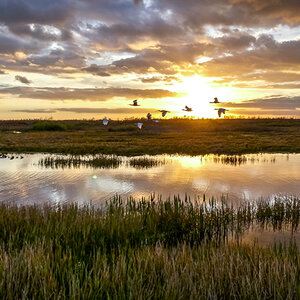NFWF doubles funding to save longleaf pine forests in nine states

The Washington, D.C.-based National Fish and Wildlife Foundation (NFWF) has announced 28 grants totaling $18 million to restore and protect longleaf pine forests in nine southern states.
The grants will leverage an additional $14.7 million in matching contributions for project support totaling $32.7 million—the largest funding slate in the program’s history and double the funding allocated in 2022. Awarded through NFWF’s Longleaf Landscape Stewardship Fund (LLSF), the funding will bolster longleaf pine habitat restoration across the tree’s historic range, which includes Alabama, Florida, Georgia, Louisiana, Mississippi, North Carolina, South Carolina, Texas, and Virginia.
According to NFWF, only 5 percent of the trees’ original habitat remains, threatening the loss of plant and animal diversity, including rare and endangered wildlife. Overall, 50,000 acres of new longleaf pine will be planted and an additional 450,000 acres of existing habitat will be restored through prescribed burning and the removal of invasive species. In addition, grantees will engage landowners through workshops, trainings, and one-on-one technical assistance to restore and maintain longleaf pine habitats on private lands.
LLSF is a public-private partnership that includes the U.S. Department of Agriculture’s Natural Resources Conservation Service, the U.S. Forest Service, the U.S. Department of Defense, the U.S. Fish and Wildlife Service, the Bezos Earth Fund, International Paper, One Tree Planted, Southern Company, Altria Group, the Orton Foundation (the North Carolina affiliate of the Moore Charitable Foundation), and Occidental Petroleum—a new partner this year. Since 2012, the partnership has invested more than $75 million and leveraged an additional $83.7 million in matching contributions.
“Longleaf forests are home to globally unique species, soak up carbon from the atmosphere, and are an important part of America’s cultural heritage,” said Bezos Earth Fund president Andrew Steer. “Unfortunately, these forests have been reduced to a fraction of their historical range. We’re pleased to work with NFWF and local partners to drive the restoration of eight million acres of this vital ecosystem.”
For a complete list of LLSF grantees, see the NFWF website.
(Photo credit: Wikimedia/Woodlot)







